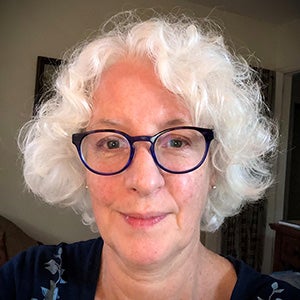- Professor, Department Chair, PhD, CCC-SLP
- Communicative Disorders
- Phone: 401.874.2735
- Email: jean.gordon@uri.edu
- Office Location: Office Location : Independence Square, Suite K, Office 185A
Biography
Dr. Jean Gordon joined the faculty at the University of Rhode Island after a long career in the Department of Communication Sciences and Disorders at the University of Iowa.
Research
Dr. Gordon conducts research on language production in typical aging and age-related neurogenic disorders, such as aphasia and dementia. She is particularly interested in the mechanisms of word retrieval and how they break down. A recent project aims to develop a more reliable and clinically informative method of measuring language production fluency in individuals with aphasia, by identifying the factors that disrupt fluency in different speakers. A third line of Dr. Gordon’s research investigates how age-related stereotypes affect communication.
Education
- PhD, Communication Sciences and Disorders, McGill University, Montreal, 2000
- MSc (applied), Communication Sciences & Disorders, McGill University, Montreal, 1992
- BA, Humanities, Bishop’s University, Lennoxville, 1986
Selected Publications
Gordon, J.K. & Chen, H. (2023). How well does the discrepancy between semantic and letter verbal fluency performance distinguish Alzheimer’s dementia from typical aging? Aging, Neuropsychology & Cognition, https://doi.org/10.1080/13825585.2022.2079602.
Shaw, C.A., Ward, C., Gordon, J.K., Williams, K.N. & Herr, K. (2022). Characteristics associated with elderspeak communication in hospital dementia care. International Journal of Nursing Studies, 132, https://doi.org/10.1016/j.ijnurstu.2022.104259.
Shaw, C.A., Ward, C., Gordon, J.K., Williams, K.N. & Herr, K. (2022). Elderspeak communication and pain severity as modifiable factors to rejection of care in hospital dementia care. Journal of the American Geriatrics Society (JAGS), https://doi.org/10.1111/jgs.17910.
Gordon, J.K. & Clough, S. (2022). How do clinicians judge fluency in aphasia? Journal of Speech Language Hearing Research, 65, 1521-1542, https://doi.org/10.1044/2021_JSLHR-21-00484.
Boyle, M., Gordon, J.K., Harnish, S.M., Kiran, S., Martin, N., Rose, M.L., Salis, C. (2022). Evaluating cognitive-linguistic approaches to interventions for aphasia within the Rehabilitation Treatment Specification System (RTSS). Archives of Physical Medicine and Rehabilitation.
Fridrikkson, J., Basilakos, A., Boyle, M., Cherney, L.R., DeDe, G., Gordon, J.K., Harnish, S.L., Hoover, E.L., Hula, W.D., Pompon, R.H., Johnson, L.P., Kiran, S., Murray, L.L., Rose, M.L., Obermeyer, J., Salis, C., Walker, G., Martin, N. (2022). Demystifying the complexity of aphasia treatment: Application of the Rehabilitation Treatment Specification System (RTSS). Archives of Physical Medicine and Rehabilitation.
Shaw, C. & Gordon, J.K. (2021). Understanding elderspeak: An evolutionary concept analysis. Innovation in Aging, 5(3), 1-18.
Gordon, J.K. (2020). Factor analysis of spontaneous speech in aphasia. Journal of Speech-Language-Hearing Research, 63, 4127-4147.
Gordon, J.K. & Clough, S. (2020). How fluent? Part B. Underlying contributors to continuous measures of fluency in aphasia. Aphasiology, 34 (5), 643-663.
Clough, S. & Gordon, J.K. (2020). Fluent or nonfluent? Part A. Underlying contributors to categorical classifications of fluency in aphasia. Aphasiology, 34 (5), 515-539.
Gordon, J.K.., Andersen, K., Perez, G. & Finnegan, E. (2019). How old do you think I am? Perceptions of age and communication. Journal of Speech, Language and Hearing Research, 62(7), 2455-2472. https://doi.org/10.1044/2019_JSLHR-L-19-0025

